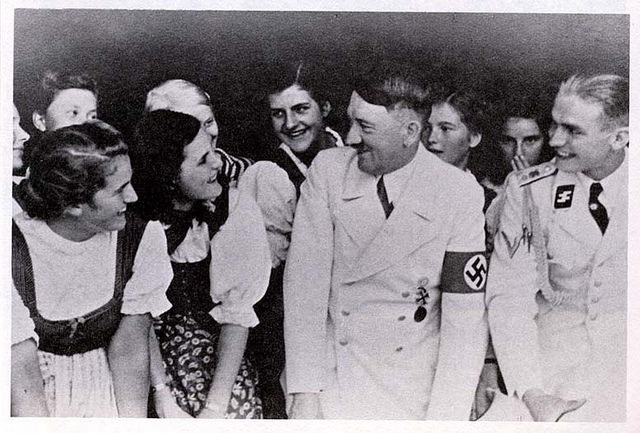A former academic colleague used to complain that people who wrote about Heidegger invariably ended up writing like Heidegger. This is not entirely fair to Heidegger scholars (although not entirely unfair either). Peter Trawny’s recently translated Freedom to Fail: Heidegger’s Anarchy affirms the legitimacy of both complaints. This is, in fact, the first of Trawny’s works that I have read in translation and, oddly enough, it is the one that I feel like I understand the least.
I mention this in the present context because of a blurb that appears on the back of the English translation of Trawny’s book by the eminent American Heideggerian Robert Bernasconi in which he describes the text as “of value to specialists as well as beginners.” With all due respect to Bernasconi, I pity anyone not already well familiar with the Heideggerian corpus who attempts to plow through Freedom to Fail. It is, indeed, a very interesting book. But it makes few concessions to those unfamiliar either with the ins and outs of the Heideggerian idiom, or with the peculiar cultural political agenda that frames it.
Trawny, as many readers will know, is the editor of the later volumes of the Heidegger Gesamtausgabe, and there is no one more familiar with the contents of volumes 94 through 96, comprising the highly contentious Schwarze Hefte. The release of these texts has roiled the world of philosophy in the continental tradition like nothing since the release of the French translation of Victor Farias’ Heidegger and Nazism almost 30 years ago. The wave of new scholarship occasioned by these new texts is far from cresting. One question that has been lurking in the background of what has been published so far is why Heidegger would allow this material to see the light of day.
Whatever else one can say about Martin Heidegger, he was nothing if not calculating about his scholarly image. One of the many virtues of Hugo Ott’s Heidegger: Unterwegs zu seiner Biographie is its extensive treatment of Heidegger’s attempts to rejig his personal history in the wake of his disastrous engagement with National Socialism. In both his occasional explanations and his strategic silences, Heidegger sought to present an image of a noble scholar failed (and later victimized) by a movement whose inadequacy to its stated tasks was not obvious in its earliest years in power. He sought thereby to obscure his wholehearted commitment to National Socialism, with all of its trappings, in the early 1930s, and the fact that his departure from it was more a matter of the lack of interest of the movement’s ideologues (such as Alfred Rosenberg) than of any disappointment on Heidegger’s part.
In his waning years, Martin Heidegger sought to shape his legacy by specifying what could be published, and when. Given that he could hardly have been ignorant of the cultural memory of National Socialism as definitive of criminality annihilating civilization, why then would he have allowed the publication of unexpurgated texts in which he espoused a commitment to a true National Socialism divorced from the supposed failings of the Hitler regime, and in which he used language critical of “World Jewry”?

This is a question that could be addressed (predominantly) historically or philosophically. Trawny chooses the latter. He adduced from a wide range of Heidegger’s post-Kehre writings the idea of the fallibility of philosophy. Rather than viewing philosophy as an enterprise devoted to the enumeration of discrete truths, on the model of the natural sciences, Heidegger characterizes it in terms of a process of thinking. This process involves an element of danger. In his lecture course from 1929-30 (published in English as The Fundamental Concepts of Metaphysics) Heidegger was unequivocal about the insecure status of philosophy:
Insight into the multiple ambiguity of philosophizing acts as a deterrent ultimately betrays the entire fruitlessness of such activity. It would be a misunderstanding if we wished in the slightest to weaken this impression of the hopelessness of philosophizing, or to mediate it belatedly by indicating that in the end things are not so bad after all, that philosophy has achieved many things in the history of mankind, and so on. This is merely idle talk that talks in a direction leading away from philosophy. We must rather uphold and hold out in this terror. For in it there becomes manifest something essential about all philosophical comprehension, namely that in the philosophical concept, man, and indeed man as a whole, is in the grip of an attack – driven out of everydayness and driven back into the ground of things.
Philosophy is, in reality, only philosophizing, prone (as Trawny notes) to errancy and unable to overcome the duality of concealment and unconcealment. All philosophizing involves error, in the same sense that Dasein’s comportment toward the phenomena of the world is predicated on a dynamic and unstable relationship to existentia in the world. Partly in recognition of this, and partly as an expression of his self-importance, Heidegger would later write in one of the Schwarze Hefte, “Perhaps even my errors still have a power to prod in an age that is overloaded with correctnesses which have long lacked the truth.”
Trawny argues, and perhaps given his position he is the only one who could argue, that Heidegger’s willingness to allow these fundamentally compromised texts to see the light of day were not simply and expression of arrogant ressentiment, but a last attempt to stem the tide of modernity as it inexorably demolished the culture of the West:
Heidegger’s thought betrays what the philosopher was: the final and probably most vehement obstructer of modernity. The Schwarze Hefte are nothing other than the wild attempt to combat the project of the “disenchantment of the world” by any philosophical and non-philosophical means available. And the Second World War more and more turned out to actually be a line of demarcation behind which everything that Heidegger loved, that in which and from which he lived, disappeared irretrievably.
Sadly, it does not help Heidegger’s case that he was not entirely wrong. The philosopher had correctly perceived the dangers of a fully administered world radiant in the sign of triumphant calamity. And he was not alone in being fooled by the pseudo-atavism in which the National Socialists clothed their modernism. Yet the fact that one errs does not, pace Heidegger’s insistence, does not absolve one from humility in the face of demonstrable and avoidable errors. The release of the Schwarze Hefte is a sort of intellectual doubling down. But in this it is like serving leftovers from a meal that no civilized person liked in the first place.
Trawny argues that Heidegger frames his project with a sort of negative freedom, in which the lack of boundaries of the philosophical enterprise is a mark of its depth and substantiality. But perhaps it is worth noting that the freedom of science (of which philosophy is one species) does not amount to absolution from barbarism. This is the underlying danger confronting (but not confronted by) both Heidegger and Nietzsche: that the joyful scientist may become an embittered apologist for the sort of barbarism that has the capacity to expunge science (and philosophy) wholesale.
Trawny is correct to argue that we must come close to anti-Semitism in order to understand it. And, by the same token, we should resist the temptation to simplify Heidegger’s oeuvre into a mere expression of his racist views. But scientists require humility as well as joy, and in this Heidegger was severely lacking.
Photograph courtesy of WWII Gallery and PhotosNormandie. Published under a Creative Common license.





